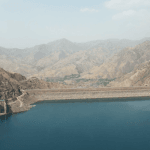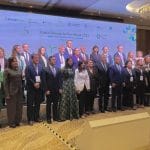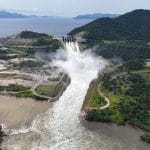HAMBURG – Cross-boarder electricity interconnections are vital for Europe to achieve its climate and energy goals and integrate more renewables into energy markets but the lack of investments in renewables in some European states is worrying, WindEurope CEO Giles Dickson told New Europe on September 25 on the sidelines of the world’s biggest wind energy event, the Global Wind Summit in Hamburg.
Dickson said he is concerned about the different levels that the European Member States are developing renewables.
“It really varies. In Spain, there were no new investments in renewables for four years under the previous government. Towards the end of the previous administration, suddenly there were auctions and wind won around 5 gigawatts (GW) of new capacity. Now under the new government, a very progressive new government, they will continue with a series of auctions for onshore wind every year,” said Dickson.
Turning to Italy, he said that there is a very positive approach to renewables and added that there has been a noticeable recovery in the Greek renewable market in recent years.
“The countries that worry us most, I think it’s fair to say, are the Czech Republic, Slovakia, Hungary, Bulgaria, and Romania because there is very little, if anything, happening in terms of new investments in these countries…they have huge potential. Look at the latest IRENA (International Renewable Energy Agency) report on wind energy in southeast Europe. The governments, I’m afraid, are not tapping into it. There are only a few notable exceptions – Serbia, Croatia, and a few others,” Dickson said.
Interconnections are essential for the security of supply and help achieve a truly integrated Europe-wide energy market, according to Dickson, who added that the Baltic nations of Latvia, Lithuania, and Estonia are taking the lead with interconnections. “The Baltics have very ambitious targets. Look at Lithuania and its national energy strategy. It’s a very ambitious, very progressive strategy.”
Meanwhile, Siemens Gamesa CEO Markus Tacke said the Baltics and countries in Northern Europe have unique advantages for offshore winds. “Very strong winds, very shallow waters, very sustainable winds, and very plannable. That makes Northern Europe an ideal strongpoint for offshore as it has very unique conditions,” Tacke, who is also the Chairman of VDMA Power Systems, told New Europe in Hamburg on September 25.
He added that there are interconnections in the north between countries, but also vital interconnections between France and Spain. “I think it’s important technology. Important to further develop renewables,” Tacke said.
European Climate Action and Energy Commissioner Miguel Arias Cañete told the Global Wind Summit delegates at a packed conference hall that low carbon investments remain a priority for the EU Member States. “Crucially, there is to be a strong link between future spending and the Clean Energy Package. Funding will be conditional on the Member States meeting certain conditions, including that they do not fall below their 2020 renewables targets throughout the programming period.”
Tacke told New Europe that the EU works on the appropriate market models. “We, as an industry, know how the market works. They need to be consistent, forward-looking, and sustainable.”
The Global Wind Summit – consisting of the WindEnergy Hamburg Expo and the WindEurope Conference – brought together more than 1,400 exhibitors, 500 speakers and presenters, as well as a star line-up of energy ministers and CEOs from around the world.
IEA Executive Director Fatih Birol said in his Hamburg speech that wind has a critical role to play in the world’s energy mix.
“It already accounts for almost 5% of electricity generation today, but its potential is much greater. With ongoing cost declines and the right government policies, it could become a leading source of generation globally in the coming decades,” said Birol.
follow on twitter @energyinsider







